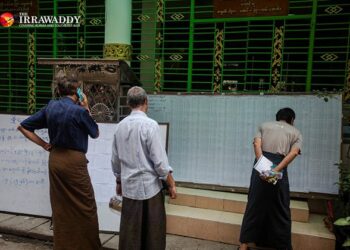JAIPUR, India — As Chandra Kala heard the blaring horns of a train, she quickened her pace, zig-zagged and elbowed across a teeming platform while hauling a sack of wheat, a suitcase and a backpack.
She placed the luggage inside a carriage just as the train began to chug out of Gandhi Nagar railway station, which in February became India’s only major terminal where women run the show.
Kala is a rare female porter in the conservative, desert state of Rajasthan in western India, and one of about 40 women holding positions traditionally held by men.
“Earlier, I used to feel very shy,” said Kala, a widow with two children. “How should I speak to passengers? How can I lift luggage? It all felt very weird.”
She had taken over her husband’s porter job when he passed away last year, and she now supports her children from her earnings of about 3,000 rupees ($40) a week.
“It does not feel weird anymore,” said Kala. “It feels really good.”
From ticket sellers and conductors, to station managers and cleaners, these trailblazers are upending sexist views and providing hope in a country where women are slowly vanishing from the workplace.
India is one of the world’s fastest growing major economies but the rate of female employment is startlingly low, in large part due to social prejudices and general disapproval of working women.
At least 20 million women—the combined population of New York, London and Paris—have left the workforce of Asia’s third-largest economy since 2005, World Bank data shows, with only 27 percent now employed.
The Gandhi Nagar initiative is part of efforts by the state-run railway—India’s biggest employer—to empower women in its workforce of 1.3 million people.
Indian Railways officials are planning to replicate the all-women staff model in other stations, according to Tarun Jain, a spokesman for the railways ministry.
The experiment has also created a financial windfall, according to Jain, who said Nagar station has experienced “record earnings” since women took over.
“The revenues have grown substantially as far as the ticket checking is concerned,” he said. “They have caught a lot of people without tickets.”
In April, the women caught 520 people attempting to ride trains or access platforms without tickets, according to data Jain provided. The station earned 133,595 rupees ($1,805) from the tickets those people then had to purchase.
In contrast, men apprehended 64 people without tickets during the same month in 2017, netting the station 11,645 rupees ($158), according to the data.
Aya Matsuura, a gender specialist at the UN’s International Labor Organization, said such initiatives are important in fighting gender stereotypes and to help “women find the confidence to enter traditionally male-dominated sectors.”
“This also sends out a positive message to the younger generation when they consider career options,” she said.
Happy Passengers
Each year, millions of tourists flock to ancient fortresses and camel-back desert safaris in Rajasthan, which is also home to some of India’s poorest villages where age-old customs like purdah, or veiling, often dictate a woman’s life.
At Gandhi Nagar station in the state capital of Jaipur, 25 trains pass through every day with about 7,000 commuters—mostly from conservative rural and tribal areas—witnessing women carrying out jobs many have only seen men do before.
Bewildered, surprised and even upset, many gawked at the women when they first took over the station and often undermined their authority, asking for a “male manager,” according to Neelam Sharma, a reservation supervisor.
“Some people reacted quite angrily,” said Sharma, adding that passengers would say things like, “We do not know how any work will get done here.”
However, as the months rolled by, Sharma said commuters were pleased to see improvements at the station, including faster service, smaller queues, better information and cleanliness.
“Now those same people come to us and really appreciate us and say things like, ‘Madam, we really like coming here, our work gets done quicker,’ and, ‘The men did not explain things to us properly,’” Sharma said.
“Passengers are quite happy now.”
Satya Narayan, a 61-year-old man who has been regular at the station since he was a little boy, agreed.
“There is a difference of night and day here,” he said. “When the men were working here, there used to be a lot of hooliganism. But now the women are taking care of everything.”
Doubts and Fears
Members of the team credit this success to their motivation to prove themselves in what is commonly considered a male bastion.
“[We] are giving our 100 percent efforts,” said station master Angel Stella, sitting behind a control panel with color-coded track lines and buttons that send signals to incoming trains in order to prevent accidents.
But it was not easy getting to this point, she said.
The women, who were mostly transferred from stations in smaller towns, had to overcome their own doubts and fears of running a station by themselves.
They had to get comfortable working night shifts and working in positions of responsibility traditionally held by men, said Stella.
“We were scared and we thought, ‘How will we do this?’”
It was also a challenge for those who lived with their children or in-laws to strike the balance between work and family, Stella added.
To ensure their comfort and safety, authorities equipped the station with CCTV cameras, deployed an all-women police force, installed sanitary pad vending machines, and created a temporary daycare.
Female employees said they hope to inspire young girls passing through the station, and trigger a change among people who think a woman’s place is at home.
“All women should come forward and stand shoulder to shoulder with men—especially in jobs that are usually seen as theirs,” said Usha Mathur, a chief reservation supervisor and mother of two.










